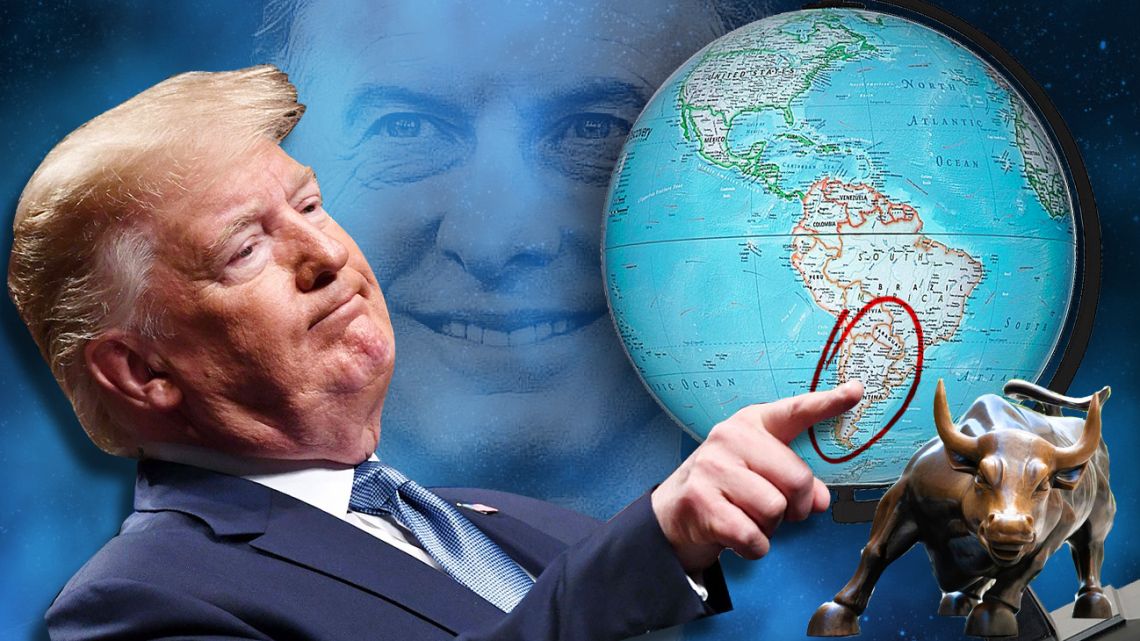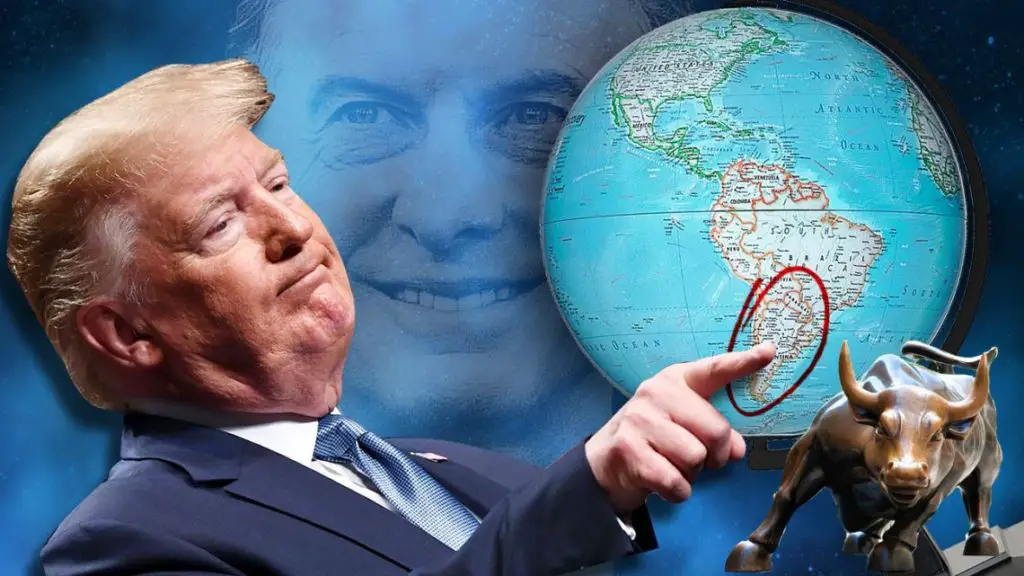
As fragile as ever, Argentina’s economy has stumbled
into some respite as of late, an issue that is being
closely followed in the United States. While the fate
of the second-largest economy in South America
isn’t all that important for Donald Trump, he understands the importance of guaranteeing a second term
for his personal friend Mauricio Macri, in the context of an attempt
to eradicate leftist populism from the Western Hemisphere. Thus,
the US pushed for the International Monetary Fund (IMF) to extend Argentina its largest-ever emergency loan, and has acknowledged the real possibility of further IMF programmes for the
nation, assuming a continuation of current
policies — which means Macri needs to defeat
Cristina Fernández de Kirchner’s ticket in this
year’s elections.
If this happens, Wall Street could partake
in a feeding frenzy while investments in the
productive economy would begin to come in.
At least US$4.5 billion is already committed
in direct investments, mainly in the energy
sector. Alberto Fernández’s Peronist envoys
have held meetings with high-ranking officials in Washington “in order to prove they are
not crazy,” according to one source, even
though US officials – and their counterparts
at the IMF and the World Bank – don’t seem
too convinced the current focus on austerity and pro-market
policies will enjoy continuity. While, speaking frankly, our
country’s strategic importance is low in the list of priorities for
the Trump administration, there’s definitely a geopolitical and
commercial interest in a second term for President Macri.
During a visit to
Washington organised by the American
Chamber of Commerce in Argentina,
I had a series of offthe-record meetings
with high-ranking
officials from the US
State Department,
US Treasury, World
Bank, the Argentine
Embassy, inves -
tment banks, journalists, and US companies with interests in
Argentina. We also
had the chance to
meet informally with
members of the IMF and debate with academics focused on the
country. Overall, I would say there’s a cautious optimism about
Argentina, stemming from an expectation that the tepid recovery
will be sustained, leading to the final defeat of Kirchnerism in the
country. This is not only important geopolitically, it would also
benefit Trump electorally as one of his main campaign messages
will point to the futility of socialism, using Nicolás Maduro’s Venezuela as a prime example of its failure.
Economists at major Wall Street banks have been looking closely at the recent economic and electoral scenario and have
pinpointed three major risk factors for Argentina. In other words,
any of these would trigger sell-offs in Argentine sovereign bonds,
which in turn would spark a dumping of Argentine stocks, a spike
in the ‘riesgo país’ country risk indicator and most probably lead
to the political demise of the ruling coalition’s ambitions.
All of these are contingent, of course, on the fact that given
Argentina’s structural deficits and its incapacity to generate enough
dollars to defend the peso against a run on the currency, its relatively limited reserves, and the reigning anxiety that dominates
anything related to peso-denominated assets these days, any exogenous shocks would lead to a “game over, enter coin” scenario for
Macri. A Fed rate-hike, the intensification of the US-China trade
war, actual combat in the Strait of Hormuz, extreme weather… you
name it, and Macri’s done.
If the Fernández-Fernández ticket takes a six to seven percentage-point lead over the Macri-Pichetto duo in the August PASO
primaries, investors will run for the hills, understanding the lead
is insurmountable. If the spread was low, but Cristina’s candidate
makes it above 40 percent, they would jump ship. And if former
economy minister, and self-proclaimed Marxist, Axel Kicillof
were to beat María Eugenia Vidal in the Buenos Aires Province
— “the mother of all battles” — major funds would lose all hope
of recovering their investments in the beleaguered nation,
meaning a writedown and financial chaos.
A few indicators make their optimism clear.
The first is the stability of the peso-dollar exchange rate, a consequence of intensely restrictive monetary policy, persistent dollar selling
by Guido Sandleris’ Central Bank, and a previous sell-off which, in part, is a consequence
of the intense dollarisation of portfolios. “There is no chance the peso-dollar can go to 100,”
an economist explained. There is even a risk
that the peso is overvalued, which is troubling
given the potential of a future shock. Yet, peso
stability has helped push the rate of inflation
rate into the 2.5-percent region, which is a key
turning point for activity to begin to take off. A
positive trade balance, the consequence of tanking imports, and
the first signs of “green shoots” or slightly positive macroeconomic
indicators, have given Macri some breathing room. The free-trade
agreement signed between Mercosur and the European Union is
another indicator of normalisation for Wall Street, which together
with the apparent trough in the recession has helped Macri gain
in opinion polls. (While a trade agreement with Mercosur has been
discussed in Washington, it is a long-shot and there is little chance
of an opening up of key US markets in the agricultural and energy sectors).
While the April Isonomía poll, putting CFK’s ticket in the lead in
a hypothetical run-off, sparked “the fear,” the average spread between Macri and Alberto including 17 polls that have come out
since the beginning of June is at 3.3 percent for the first round, in
Fernández’s favour. Macri’s recovery even has him leading in the
latest Management & Fit survey with 38.6 percent of the vote against
Fernández’s 38.5 percent. This has translated into numerous market events for Argentina in recent weeks, with several private bond
offerings and even rumours of an upcoming IPO. The attractiveness
of Argentina is, of course, the Vaca Muerta field in Patagonia, which
could make the country a global gas powerhouse. In order for this
to happen though – and it is not guaranteed that it will – the whole
of the energy sector needs to come together, sink the capital to
generate the proper infrastructure, and make sure Argentina’s
natural gas prices are competitive with US production.
It is unquestionable that Macri has been extremely successful in
re-integrating Argentina into the global community. This, and the
relations developed across all levels of multilateral organisations
and Washington agencies, is the key factor behind the financial
support it’s receiving from the US. Add in geopolitics and the
Macri-Trump relationship, and it means many in Washington are
doing what they can (within their own preconceived notions of what
the world should look like) in order for Argentina to succeed. Christine Lagarde’s departure from the IMF shouldn’t modify its position
on Argentina, nor its predisposition to flexibility. Being owed nearly
US$60 billion, it is important from a reputational standpoint for the
Fund, and the Treasury, that the Macri experiment succeeds. Will
they renegotiate? Absolutely, as long as it occurs through the Fund’s
own mechanisms. Will they free up more cash? Quite possibly, as
there are several cases of nations needing several IMF programmes
to succeed. “The Fund will get its money back,” they note in DC.
But even if Macri does take the election, and positive capital flows
come in, it will take some time for the trust of “real investors” to
allow them to sink in direct capital into the productive economy.
And what about 2020? “We should be asking you that question,”
several of them said.
Descargo de responsabilidad
Toda la información contenida en este sitio web se publica solo con fines de información general y no como un consejo de inversión. Cualquier acción que el lector realice sobre la información que se encuentra en nuestro sitio web es estrictamente bajo su propio riesgo. Nuestra prioridad es brindar información de alta calidad. Nos tomamos nuestro tiempo para identificar, investigar y crear contenido educativo que sea útil para nuestros lectores. Para mantener este estándar y continuar creando contenido de buena calidad. Pero nuestros lectores pueden basarse en su propia investigación.


